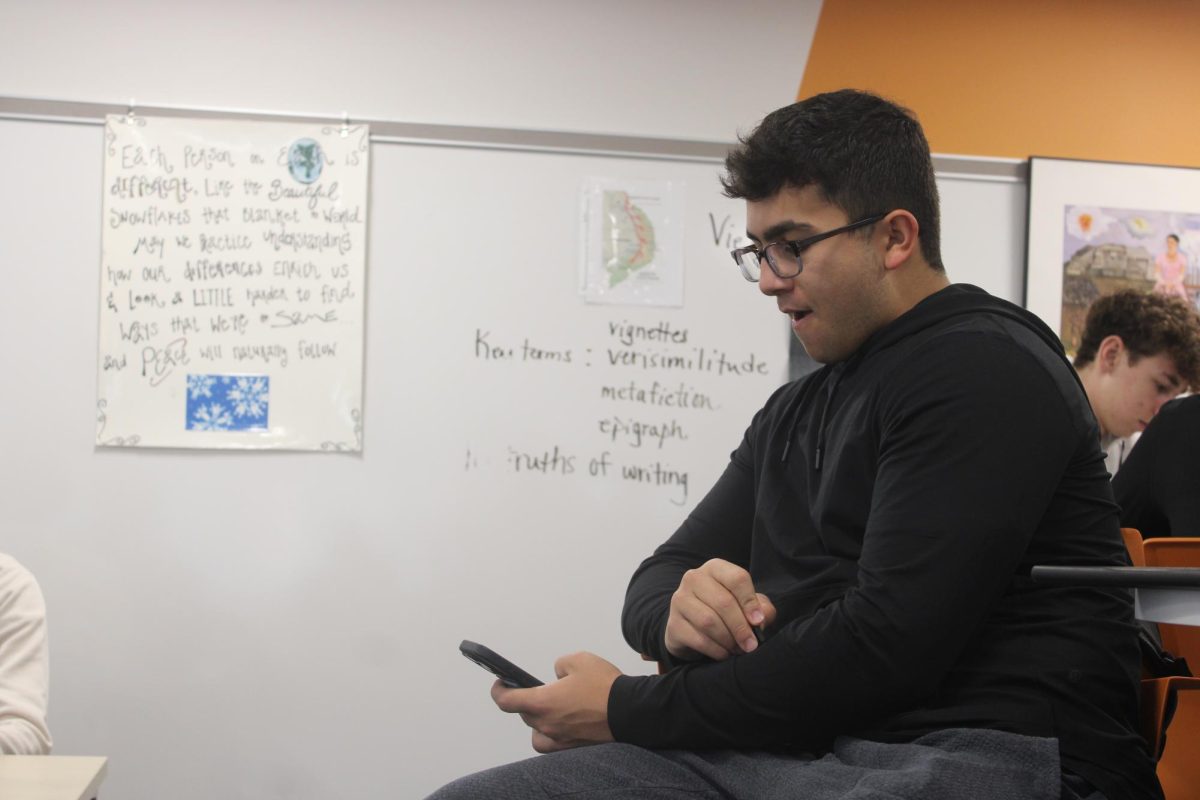
Ryan Moran
Senior Josh Fink checks his phone March 11. Fink started a bracket challenge for students at Park to compete against each other for a prize.
It’s the month of March, and the NCAA basketball tournament is tipping off with the opportunity to play for a national championship. The tournament is known as March Madness because of insane buzzer-beaters and upsets. It’s an opportunity for small schools to compete against America’s largest universities. If the small schools get lucky and upset the big schools, it goes down in school history. For example, last year, when 14-seed Oakland defeated the 3-seed Kentucky wildcats. It’s also an opportunity for fans to compete with each other for the perfect bracket—a perfect bracket has never been done before.
Sophomore Griffin Hanson said people are passionate about the bracket challenge. He said it is special because many people enjoy basketball and it creates a fun atmosphere.
“It’s always fun because a lot of students get competitive over what team they like and everyone is interested in their brackets, hoping they do well,” Hanson said. “It’s also a sport that a lot of people like, even though not everyone plays it.”
Math teacher Anson Opara said he enjoys watching the tournament. He said he is most impressed by the upsets that seem to be impossible.
“It’s exciting, especially the first week; you have all these teams and anything can happen,” Opara said. “You can take a number one seed, and the last three years, they’ve shown that they can be beaten by the 16-seed. It’s fun to watch.”
Senior Josh Fink said he likes the unique experience of having games going on while at school. Fink said students are focused on the games while doing school work.
“It’s really fun because everyone’s trying to check the scores as much as they can while they are obviously still doing all their work,” Fink said. “Students try to watch the games and make sure they are caught up with how their bracket is doing.”
Opara said he started his own class bracket challenge because of the ways he could apply it to the classroom. He said it also brings the class together because it gets kids to pay attention.
“I started one because it helped engagement. Kids were already into it anyway, so I said ‘I like it myself, we can discuss it (in class),’” Opara said. “I talked about math with it, like chances of getting a perfect bracket and things like that. We use it as a tool.”
For the second year, Fink said he is running his own bracket challenge. Last year, he said he had more than 150 friends and family join to compete for the winning bracket. He said he organized a bracket because no one really ran a schoolwide one and he likes being a leader.
“It started out as something that was a little fun to do. I’ve run fantasy football leagues before, and I like being a commissioner and that kind of stuff,” Fink said. “I feel important when I have all that responsibility. Also, no one was organizing one, and I felt like there should be one for our school.”
According to Opara, when March Madness games are being played during school, students are sometimes distracted. He said the cell phone policy and online restrictions from Park will likely make it hard to access.
“In the past, there’s a lot of kids watching all the time—even staff watch. I think now they’ve kind of got a pretty good lock on it, so it’s blocked on most things,” Opara said. “Even the teachers can’t do it on their computers anymore.”
According to Hanson, what makes brackets attractive to people is the fact that it’s a challenge. He said because there are so many teams in the tournament, it makes it very hard to have a successful bracket.
“Because it’s so large, it’s hard to create a bracket that is good. Basketball is one of the few sports with so many spots in the tournament,” Hanson said. “(Many spots in the tournament) kind of makes it fun because it’s impossible to make a perfect bracket and it’s a challenge for people to compete against each other.”
March Madness begins with the First Four on March 18 streaming on CBS and TNT.
